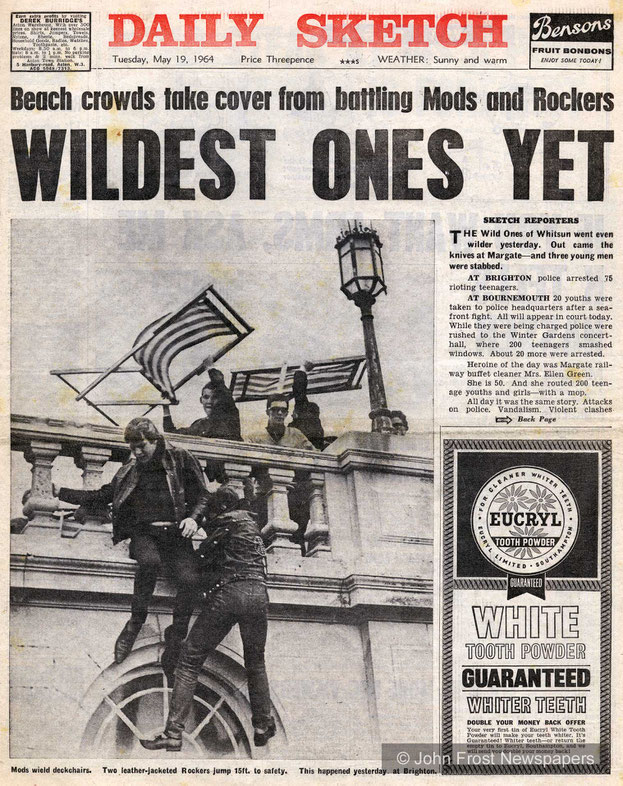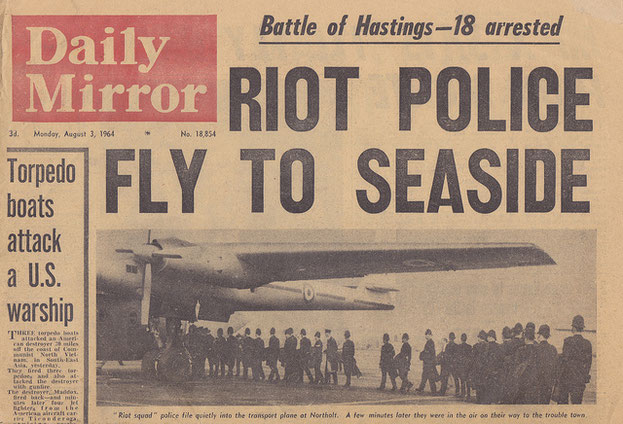Yesterday's blog post looked at Mods and Rockers and the problems they caused. The reaction from the establishment, the authorities and the state was extreme. It was so extreme, in fact, that many people say that it was staged with the sole intention of giving more power and money to state authorities, the press (their propaganda campaignists) and the establishment. Read on!


Is Moralizing the Real Crime?
Are moralists moral? Do do-gooders do good? Probably not.
The first big problem is that the consumers of newspapers and TV news programmes often believe the lies and exaggeration that they are told. Sociologists refer to this as ‘Deviancy Amplification Spiral’.
The mechanism functions like this:
a. Anti-social behaviour occurs.
b. The ‘selected’ event is reported in the press.
c. Other similar events (not necessarily related) are reported.
The event now looks like a trend.
d. The public reports similar events.
e. Public anger increases and a moral panic begins.
f. Politicians, authorities, police (and sometimes the military)
want more public money spent to stop the ‘crisis’.
The spiral ends when:
1. Authorities cannot find more cases – because they didn’t really exist (or were isolated cases that had been exaggerated).
2. People get bored listening to the same stories.
3. The events are obviously fantasy.
Typical moral panics include: satanic sects, immigrants, war on drugs, public health issues, paedophilia, video games and violence
Historical moral panics include: witch hunts, baby snatching, crime epidemics
Sociologist and criminologist Stanley Cohen says that a moral panic is “…a condition, episode, person or group of persons emerges to become defined as a threat to societal values and interests.”
The word ‘interest’ is key. What are the interests?
The people who benefit are many. They include:
· politicians and the political class
· newspaper sellers
· online blogs, magazines and channels who profit from sensationalism
· security services
· the police (allocation of more public resources)
· the military (allocation of more public resources)
· church and religious leaders
· the paparazzi
Cultural theorist Stuart Hall wrote, ‘…are often manipulated for political and economic purposes; moral panics could thereby be ignited to create public support for the need to "...police the crisis."
But not only the ‘moral majority’ benefit. The protagonists themselves can benefit too. The bad guys can increase their fame and notoriety. Terrorism is a crime that has increased at an almost identical rate as the media. The terrorists shake the trees. The media collects the fruit.

Are you superior?
Moralising is based on feelings of superiority. Britain loves to moralize. This happens because the country has very strong ideas about class and identity. Some social groups, like white middle-aged people from the middle class, have many people who think that they are more important than other groups. The media loves to fuel this. Often young people do the opposite. Many times youth groups (like the mods or the rockers) enjoy being low class or enjoy being the baddies.
This idea has been expressed in different ways:
Toni Montana, the fictional drug dealer in the film Scarface got drunk in the famous restaurant scene. He shocked ‘classy’ diners by saying:
‘You need people like me. You need people like me so you can point your fuckin' fingers and say, "That's the bad guy." So...what that make you? Good? You're not good… You just know how to hide, how to lie…’
This form of moral judgement which makes one person feel superior and hides their own imperfects or crimes was also expressed in a very different way by the German-American sociologist Erich Fromm:
“There is perhaps no phenomenon which contains so much destructive feelings as “moral indignation,” which permits envy or hate to be acted out under the guise of virtue. The “indignant” person has for once the satisfaction of despising and treating a creature as “inferior,” coupled with the feeling of his own superiority and rightness.”
Check out the latest learn English with ZakWashington video. In this mini-episode Zak and Abdel go to Brighton beach. (Full script and lesson in Lesson 4)


